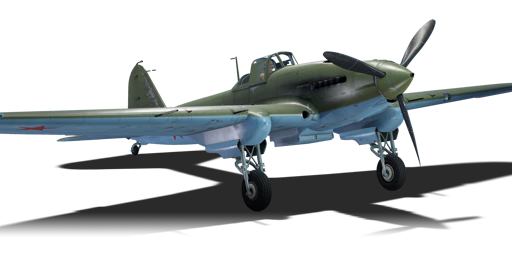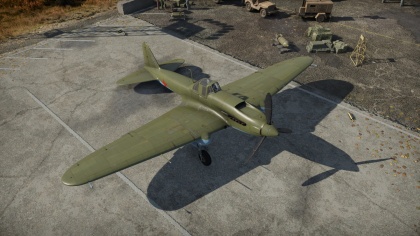Difference between revisions of "IL-2 (1941)"
m |
(Added history.) |
||
| Line 212: | Line 212: | ||
'''Cons:''' | '''Cons:''' | ||
| − | * Limited view from cockpit due to | + | * Limited view from cockpit due to armour plates |
* Large drop in performance compared to a Yak-2 | * Large drop in performance compared to a Yak-2 | ||
== History == | == History == | ||
| − | ''Describe the history of the creation and combat usage of the aircraft in more detail than in the introduction. If the historical reference turns out to be too long, take it to a separate article, taking a link to the article about the vehicle and adding a block "/ History" (example: <nowiki>https://wiki.warthunder.com/(Vehicle-name)/History</nowiki>) and add a link to it here using the <code>main</code> template. Be sure to reference text and sources by using <code><nowiki><ref></nowiki></code>, as well as adding them at the end of the article. This section may also include the vehicle's dev blog entry (if applicable) and the in-game encyclopedia description (under <code><nowiki>=== Encyclopedia Info ===</nowiki></code>, also if applicable).'' | + | <!--''Describe the history of the creation and combat usage of the aircraft in more detail than in the introduction. If the historical reference turns out to be too long, take it to a separate article, taking a link to the article about the vehicle and adding a block "/ History" (example: <nowiki>https://wiki.warthunder.com/(Vehicle-name)/History</nowiki>) and add a link to it here using the <code>main</code> template. Be sure to reference text and sources by using <code><nowiki><ref></nowiki></code>, as well as adding them at the end of the article. This section may also include the vehicle's dev blog entry (if applicable) and the in-game encyclopedia description (under <code><nowiki>=== Encyclopedia Info ===</nowiki></code>, also if applicable).''--> |
| + | |||
| + | The famous IL-2 Sturmovik was a Soviet WWII-era attack aircraft created by the Ilyushin Design Bureau and nicknamed ''Hunchback'' by Red Army troops due to the distinct fuselage shape. While the designers nicknamed their aircraft the ''Flying Tank'', Luftwaffe pilots, due to the IL-2's incredible ability to withstand battle damage, instead called it the ''Betonflugzeug'' (Concrete Plane). German ground troops, conversely, despised and feared the IL-2, giving it a slew of unpleasant nicknames, such as ''Schlachter'' (Butcher); ''Fleischwolf'' (Meatgrinder); ''Eiserner Gustav'' (Iron Gustav) and ''Schwarzer Tod'' (the Black Death). Some historians believe that the ''Black Death'' was actually a successful invention of the Soviet propaganda machine that caught on with the Germans. | ||
| + | |||
| + | The IL-2 was the most mass-produced military aircraft in history. However, early in the war German air superiority coupled with the absence of rear gunners on early variants and poorly organized Soviet fighter escorts led to high rates of losses for the type. A favourite attack tactic for IL-2 pilots was a low-level attack run, first letting loose with rockets at 600-700 meters, then firing onboard armament from a distance of 400 to 600 meters. Bombs would be dropped in subsequent passes from an altitude of 100-200 meters, using an impact fuse. The recommended tactic for attacking concentrations of soft targets was a strafing run in a shallow dive from 100-200 meters and a subsequent dropping of bombs at a low level when exiting the dive. | ||
== Media == | == Media == | ||
Revision as of 11:24, 8 May 2019
Contents
| This page is about the Russian attacker IL-2 (1941). For other uses, see T-34 (Family). |
Description
The IL-2 (1941) is a rank Russian attacker
with a battle rating of (AB), (RB), and (SB). This aircraft was introduced in Update 1.47 "Big Guns".
General info
Flight Performance
Describe how the aircraft behaves in the air. Speed, manoeuvrability, acceleration and allowable loads - these are the most important characteristics of the vehicle.
| Characteristics | |||||||
|---|---|---|---|---|---|---|---|
| Stock | |||||||
| Max Speed (km/h at ?,000 m) |
Max altitude (meters) |
Turn time (seconds) |
Rate of climb (meters/second) |
Take-off run (meters) | |||
| AB | RB | AB | RB | AB | RB | ||
| ? | ? | ??.? | ??.? | ??.? | ??.? | ??? | |
| Upgraded | |||||||
| Max Speed (km/h at ?,000 m) |
Max altitude (meters) | Turn time (seconds) | Rate of climb (meters/second) |
Take-off run (meters) | |||
| AB | RB | AB | RB | AB | RB | ||
| ? | ? | ??.? | ??.? | ??.? | ??.? | ??? | |
Details
| Features | ||||
|---|---|---|---|---|
| Combat flap | Take-off flap | Landing flap | Air brakes | Arrestor gear |
| X | X | X | X | X |
| Limits | ||||
|---|---|---|---|---|
| Wing-break speed (km/h) |
Gear limit (km/h) |
Combat flap (km/h) |
Max Static G | |
| + | - | |||
| ??? | ~?? | ~? | ||
| Optimal velocities | |||
|---|---|---|---|
| Ailerons (km/h) |
Rudder (km/h) |
Elevators (km/h) |
Radiator (km/h) |
| < ??? | < ??? | < ??? | > ??? |
| Compressor (RB/SB) | ||
|---|---|---|
| Setting 1 | ||
| Optimal altitude | 100% Engine power | WEP Engine power |
| ?,??? m | ??? hp | ?,??? hp |
Survivability and armour
Examine the survivability of the aircraft. Note how vulnerable the structure is and how secure the pilot is, whether the fuel tanks are armoured, etc. Describe the armour, if there is any, and also mention the vulnerability of other critical aircraft systems.
Armaments
Offensive armament
Describe the offensive armament of the aircraft, if any. Describe how effective the cannons and machine guns are in a battle, and also what belts or drums are better to use. If there is no offensive weaponry, delete this subsection.
Suspended armament
Describe the aircraft's suspended armament: additional cannons under the wings, bombs, rockets and torpedoes. This section is especially important for bombers and attackers. If there is no suspended weaponry remove this subsection.
Defensive armament
Defensive armament with turret machine guns or cannons, crewed by gunners. Examine the number of gunners and what belts or drums are better to use. If defensive weaponry is not available, remove this subsection.
Usage in battles
Describe the tactics of playing in an aircraft, the features of using vehicles in a team and advice on tactics. Refrain from creating a "guide" - do not impose a single point of view, but instead, give the reader food for thought. Examine the most dangerous enemies and give recommendations on fighting them. If necessary, note the specifics of the game in different modes (AB, RB, SB).
Manual Engine Control
| MEC elements | ||||||
|---|---|---|---|---|---|---|
| Mixer | Pitch | Radiator | Supercharger | Turbocharger | ||
| Oil | Water | Type | ||||
| Controllable | Not controllable | Not controllable | Not controllable | Separate | Not controllable | Not controllable |
Modules
| Tier | Flight performance | Survivability | Weaponry | ||
|---|---|---|---|---|---|
| I | Fuselage Repair | Radiator | |||
| II | Compressor | Airframe | |||
| III | Wings Repair | Engine | |||
| IV | Engine Injection | Cover | |||
Pros and cons
Pros:
- Diverse payload options - allows for varied playstyles
- Heavily armed, two cannons and two machine guns
- Armored in the front
- Usable as a fighter
- Large ammo pool, almost 50% more cannon ammo than a Yak-2
Cons:
- Limited view from cockpit due to armour plates
- Large drop in performance compared to a Yak-2
History
The famous IL-2 Sturmovik was a Soviet WWII-era attack aircraft created by the Ilyushin Design Bureau and nicknamed Hunchback by Red Army troops due to the distinct fuselage shape. While the designers nicknamed their aircraft the Flying Tank, Luftwaffe pilots, due to the IL-2's incredible ability to withstand battle damage, instead called it the Betonflugzeug (Concrete Plane). German ground troops, conversely, despised and feared the IL-2, giving it a slew of unpleasant nicknames, such as Schlachter (Butcher); Fleischwolf (Meatgrinder); Eiserner Gustav (Iron Gustav) and Schwarzer Tod (the Black Death). Some historians believe that the Black Death was actually a successful invention of the Soviet propaganda machine that caught on with the Germans.
The IL-2 was the most mass-produced military aircraft in history. However, early in the war German air superiority coupled with the absence of rear gunners on early variants and poorly organized Soviet fighter escorts led to high rates of losses for the type. A favourite attack tactic for IL-2 pilots was a low-level attack run, first letting loose with rockets at 600-700 meters, then firing onboard armament from a distance of 400 to 600 meters. Bombs would be dropped in subsequent passes from an altitude of 100-200 meters, using an impact fuse. The recommended tactic for attacking concentrations of soft targets was a strafing run in a shallow dive from 100-200 meters and a subsequent dropping of bombs at a low level when exiting the dive.
Media
Excellent additions to the article would be video guides, screenshots from the game, and photos.
See also
Links to the articles on the War Thunder Wiki that you think will be useful for the reader, for example:
- reference to the series of the aircraft;
- links to approximate analogues of other nations and research trees.
External links
Paste links to sources and external resources, such as:
- topic on the official game forum;
- encyclopedia page on the aircraft;
- other literature.
| USSR strike aircraft | |
|---|---|
| IL-2 | IL-2 (1941) · IL-2 (1942) · IL-2M (1943) · IL-2M type 3 · IL-2M "Avenger" · IL-2-37 · IL-2 M-82 |
| IL-8 | IL-8 (1944) |
| IL-10 | IL-10 · IL-10 (1946) |
| Pe-3 | Pe-3 (e) · Pe-3 · Pe-3bis |
| Su-2 | BB-1 · Su-2 MV-5 · Su-2 TSS-1 · Su-2 (M-82) |
| Su-6 | Su-6 · Su-6 (AM-42) · Su-6 (M-71F) |
| Su-8 | Su-8 |
| Tandem MAI | Tandem MAI |
| TIS MA | TIS MA |
| Tu-1 | Tu-1 |
| Yak-2 | Yak-2 KABB |





